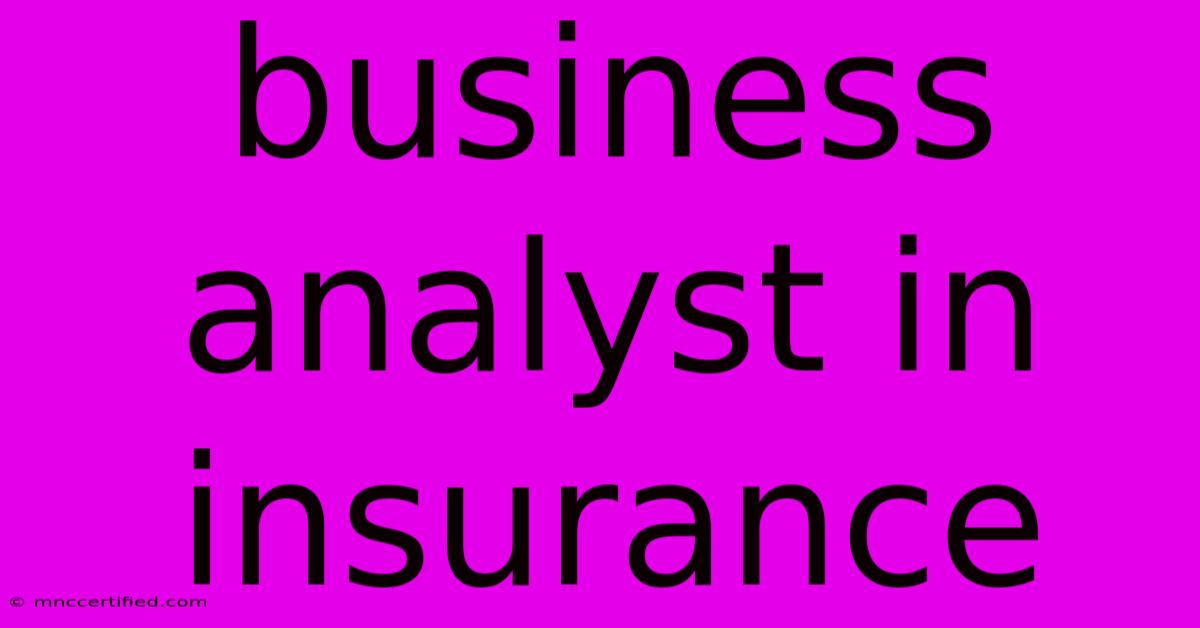Business Analyst In Insurance

Table of Contents
The Essential Role of a Business Analyst in Insurance
The insurance industry, a complex landscape of risk assessment, policy management, and customer relations, relies heavily on data-driven decision-making. This is where the business analyst in insurance steps in, playing a pivotal role in optimizing operations, improving customer experience, and driving profitability. This article explores the crucial functions of a business analyst within this sector, highlighting the necessary skills and the rewarding career path it offers.
What Does a Business Analyst in Insurance Do?
A business analyst in insurance acts as a bridge between business needs and technical solutions. Their responsibilities are multifaceted and often involve:
-
Requirements Elicitation and Analysis: This is the cornerstone of their work. They gather requirements from various stakeholders – underwriters, claims adjusters, actuaries, IT teams, and customers – to understand the business problems and translate them into clear, concise specifications for software development or process improvement initiatives. This might involve analyzing vast datasets to identify trends and patterns impacting policy sales or claims processing.
-
Process Improvement and Optimization: Insurance companies grapple with complex workflows. Business analysts identify bottlenecks and inefficiencies in these processes – from policy issuance to claims settlement – and design solutions to streamline operations, reducing costs and improving turnaround times. This often involves using techniques like Six Sigma and Lean methodologies.
-
Data Analysis and Reporting: Analyzing large datasets is crucial. Business analysts use their analytical skills to extract actionable insights from policy data, claims data, customer data, and market trends. They create reports and visualizations to communicate these findings to stakeholders, informing strategic decisions. Data visualization tools like Tableau and Power BI are essential for this role.
-
Project Management Support: While not always the project manager, business analysts often play a vital role in project planning, execution, and monitoring, ensuring projects remain on track and within budget.
-
System Implementation and Testing: They're often heavily involved in the implementation of new systems, from core insurance platforms to CRM systems, ensuring the successful integration of technology into the business processes. This includes rigorous testing to validate that the new systems meet the defined requirements.
Specialized Areas for Business Analysts in Insurance
The specific tasks of a business analyst can vary depending on their specialization within the insurance industry. Some common areas include:
- Claims Management: Optimizing claims processes, reducing fraud, and improving customer satisfaction related to claims.
- Underwriting: Analyzing risk profiles, developing pricing models, and improving underwriting efficiency.
- Policy Administration: Streamlining policy issuance, renewal, and cancellation processes.
- Customer Relationship Management (CRM): Enhancing customer interactions, improving retention rates, and personalizing customer experiences.
Essential Skills for a Business Analyst in Insurance
To thrive in this role, a strong skill set is crucial. This includes:
- Analytical Skills: The ability to analyze large datasets, identify patterns, and draw meaningful conclusions is paramount.
- Communication Skills: Effectively conveying complex information to both technical and non-technical audiences is critical.
- Problem-solving Skills: Identifying and resolving business problems creatively and efficiently.
- Technical Skills: Proficiency with data analysis tools (SQL, Excel, Tableau, Power BI), project management software (Jira, Asana), and potentially programming languages (Python, R) is beneficial.
- Domain Knowledge: Understanding the insurance industry, its regulations, and its specific business processes is a significant advantage.
Career Progression and Salary Expectations
A career as a business analyst in insurance offers significant growth potential. With experience, professionals can advance to senior business analyst, lead business analyst, or even management roles. Salary expectations vary based on experience, location, and company size, but generally offer competitive compensation packages.
The Future of Business Analysts in Insurance
With the increasing adoption of AI and machine learning within the insurance sector, the role of the business analyst is becoming even more critical. They will play a vital role in leveraging these technologies to automate processes, enhance risk management, and personalize customer experiences.
This makes a career as a business analyst in insurance a dynamic and rewarding choice for those with a passion for data, problem-solving, and the insurance industry. The demand for skilled professionals in this field is high, and the opportunities for growth are significant.

Thank you for visiting our website wich cover about Business Analyst In Insurance. We hope the information provided has been useful to you. Feel free to contact us if you have any questions or need further assistance. See you next time and dont miss to bookmark.
Featured Posts
-
Nfl Teams Thanksgiving Day Patches
Nov 29, 2024
-
Governor Newsom Thanksgiving 2024
Nov 29, 2024
-
Europa League Rangers Player Performance
Nov 29, 2024
-
East Coast Insurance Services
Nov 29, 2024
-
Europa League Man Utd Lineup Prediction
Nov 29, 2024